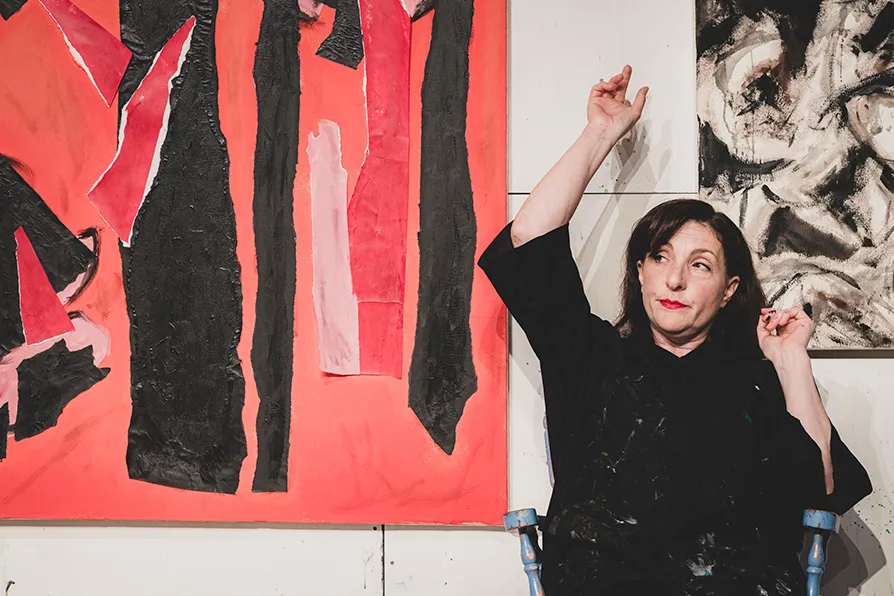DENNIS BROE searches the literary canon to explore why a duplicitous, lying, cheating, conning US businessman is accepted as Scammer-in-Chief
JAN WOOLF relishes a drama that depicts Lee Krasner, the widow of Jackson Pollock, in combat with a wannabe painter and a hasbeen ghost

 TOUR DE FORCE: Helen Goldwyn as Lee Krasner [Pic: Giacomo Giannelli]
TOUR DE FORCE: Helen Goldwyn as Lee Krasner [Pic: Giacomo Giannelli]
Lee
Park Theatre, London
★★★★
I’VE just read John Updike’s 2002 novel, Seek My Face, about a young journalist’s interview with a fictional Lee Krasner. The format of this play is similar, using a great conceit/device to tell a story about an art power-couple; fame, sacrifice and the production of art.
Lee, written by Cian Griffin, is set in Lee Krasner’s studio in 1969, 13 years after the death of her famous husband, Jackson Pollock, in a drink/drive “accident.” She was in Paris at the time, and note the inverted commas.
We open as Lee paints to jazz music, interrupted by local grocery delivery boy Hank, played with great style and sensitivity by Will Bagnell. An irascible Lee wants him to leave the groceries and go, so that she can get on with her own precious work in the time she has left, unsullied by a difficult hubby.
But he finds the courage to ask her to look at his portfolio of drawings as he’s on his way to art school. Is he any good? Can she give advice?
Red flag moment! And the audience — already invested — draw breath as one.
Lee is not only interrupted but has to look at this “juvenile rubbish” (my words, not hers). The young man persists, and we hear his own story of loss and threshold poverty — pushing on with great courage into Krasner’s painting time. This alone should indicate how serious he is. We also hear of what Mr Pollock left Hank’s father in lieu of an unpaid bill for groceries and a lot of booze.
The building of tension — will she/won’t she let him keep that early work — is strong. The stakes are high. No spoilers here, but the work is full of significance beyond its merit as an early drip painting.
Jackson Pollock has his own set pieces of intervention as an angsty, angry ghost summoned through Lee’s imagination, performed in a great set of cameos by Tom Andrews. At one point I worried that Pollock’s act of lighting a cigarette might ignite a jar of turps — but he himself ignites through his own anger.
Lee’s early irritable conversations with both men, the live Hank and the dead Pollock, develop into art sophistry; the meaning of it and why we do it. “The result is the process,” declares Lee, and the reason that Hank really wants to paint earns Lee’s respect, even though it isn’t as profound as her own: “Art is life; I am alive therefore I paint.”
The demolition and reassembly of a drawing on paper is a great metaphor for the tearing apart of Hank’s self-esteem and later rescue. The young man is further soothed by an offer from Lee that heals the earlier insults. So, everybody is OK — except the roving, angry ghost of Jackson Pollock. But it’s not about him. Rather, it concerns the tensions between alleged plagiarism, the creative act, and what makes a successful artist in a certain time and place.
This is post-war US where abstract expressionism is being encouraged by the CIA which wants to foster individualism through freedom of expression to counterpoint the Socialist Realism painting of the Soviet Union. This isn’t covered in the play — no matter, it’s riveting, and the protagonists at the time may not have known this.
In the end we get the big picture — but I wished the one Lee was working on was a better one. Helen Goldwyn’s Lee Krasner is a tour de force, with an incredible emotional range.
Eliot Sheppard’s lighting and Ian Nicholas’s set are very good, with a reconstruction of Krasner’s Long Island Studio, with some of her paintings and a drippy floor — which must have been fun to do. Director Jason Moore has done great work interweaving the separate conversations, and the dips and dives of fragile senses of self and how they can hold up through making art.
Runs until October 18. Box office: (020) 7870-6876, parktheatre.co.uk.









